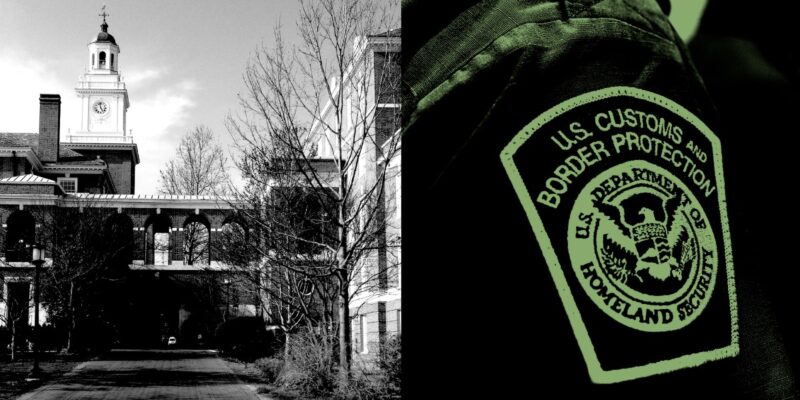
In September 2019, after more than a year of protests, Johns Hopkins University announced that it would end its contracts with the Department of Homeland Security’s Immigration and Customs Enforcement agency. The contracts totaled more than $1 million; the university provided emergency medical response training for immigration agents. The cancellation came amid a wider push at a handful of universities to end partnerships with the agency in response to the Trump administration’s “zero tolerance” policy that separated families seeking asylum and detained children at the border.
But, it appears, the public end of ICE contracts did not mean JHU stopped working with federal agencies that police immigration. According to a Mother Jones review of active federal contracts, Hopkins has since been awarded three new contracts, two of them still active, by Customs and Border Protection (CBP). Some $70 million of the contracts have been fulfilled so far but the potential award amount exceeds $100 million, according to a review of the contracts. One of the contracts began just 11 days after the school publicly announced it had ended its partnership with ICE.
While ICE and CBP are separate federal agencies, both fall under the Department of Homeland Security. ICE is primarily responsible for enforcing immigration laws inside the United States, which includes tracking and arresting people for immigration proceedings (including in large workplace raids), while CBP employs Border Patrol and oversees ports of entry and border detention facilities. The agencies are known to overlap; Border Patrol agents, for instance, are authorized to work within 100 miles of all US borders—covering nine of the 10 largest metropolitan cities in the United States.
Johns Hopkins University did not respond to a request for comment.
The three contracts that CBP awarded to Johns Hopkins go far beyond medical training. Two are funding the school’s Applied Physics Laboratory to research and develop a surveillance software, called Minotaur, that can track people crossing the border from both land and ocean. The technology operates a bit like “gaming software” according to an article in CBP’s Frontline Magazine. “Without this technology,” an engineer on the project said, “spotting the bad guys would be more by chance.”
Drew Daniel, an English professor at Johns Hopkins University, who was active in the fight against JHU’s ICE partnership, said he did not know about the contracts with CBP. Daniel learned that Johns Hopkins was getting funding from ICE contracts through the JHU graduate student workers union in 2018. He then wrote a petition calling for the university to end contracts. Thousands signed on, including students, staff and some members of the administration. In the following months the student group, the Hopkins Coalition Against ICE (HCAI), led protests, walkouts, and a 35 day sit-in that ended in 80 police officers entering the campus administrative building and arresting three community members and four students.
Four months later, the school announced the contracts would not be renewed. There was a lot of celebration, Daniel told me, because it was evidence that the university is vulnerable to pressure from press attention. “But there was always a question mark for us,” he said. “How much of this is a sincere expression of a desire not to be associated with a racist policing regime and how much of this is just PR?”
At the time of cancellation, the university did not provide a reason for ending the contracts with ICE but, in an email statement, said they were working with the Department of Homeland Security to “allow for a safe and orderly wrap up” of the programs. JHU had received $7.4 million from contracts with ICE since 2008.
Daniel hopes there will be a new wave of activism and public pressure to hold the university accountable again. One current student group, the Coalition Against Policing by Hopkins, has been protesting the university’s plan for a private police force.
“If the Hopkins administration thinks that students don’t care or haven’t noticed,” Daniel said, “they’re wrong.”















